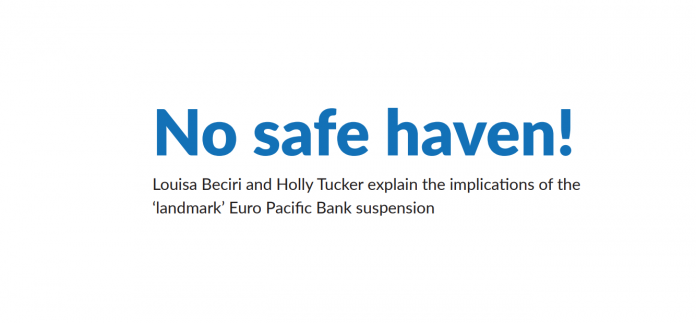Louisa Beciri and Holly Tucker explain the implications of the ‘landmark’ Euro Pacific Bank suspension On 30 June 2022, Euro Pacific Bank was suspended following an investigation by HM Revenue and Customs and the Joint Chiefs of Global Tax Enforcement (‘J5’).
The J5 is made up of HMRC and its counterparts in Australia, Canada, the Netherlands and the United States, and was formed to combat international tax crime by sharing intelligence and operating joint investigations.
The investigation into the Puerto Rican bank was launched two years ago due to suspicions that the bank had been facilitating tax evasion and aiding money laundering. HMRC believes there are nearly 1,000 UK residents that have used the bank’s services. Given the extent of the investigation, it is reasonable to expect HMRC will have already identified these individuals and they have confirmed a series of investigations have already started, in what HMRC describes as a “landmark moment in HMRC’s response to offshore tax evasion”. It is expected that many more investigations are to follow.
Offshore focus
HMRC’s focus on combatting offshore non-compliance comes as no surprise. In 2019, HMRC updated its strategy for tackling offshore non-compliance: No Safe Havens. The strategy aims to create tax transparency through worldwide information sharing. It focuses on three main areas to achieve its goals:
• exchanging information internationally;
• championing international tax transparency; and
• strengthening operational collaboration.
At the time the updated strategy was published, the tax gap was at a near record low of 5.7%. Between 2010 and 2019, HMRC raised over £2.9 billion through tackling offshore tax noncompliance and on 23 June 2022 the tax gap was estimated to be at 5.1%. There is still some way to go, however. On 31 May 2022, in response to a Freedom of Information request, HMRC confirmed that in 2019 UK residents had £850 billion in financial accounts overseas, £570 billion of which was held in tax havens.
HMRC’s focus on tackling offshore non-compliance is aided by the vast amount of data HMRC receives. Since 2017, HMRC has been receiving financial information on UK residents from over 100 jurisdictions under the Common Reporting Standard (‘CRS’). Under the CRS, financial institutions in participating jurisdictions are required to report detailed information on account holders.
This information is then shared with the tax authority in the CRS participating jurisdiction where the account holder is resident. In September 2021, HMRC received data on 7.1 million accounts from 91 jurisdictions. Puerto Rico, however, is not currently a participating country under the CRS and it is therefore anticipated that HMRC will have obtained a lot of new financial information as a result of the investigation into Euro Pacific Bank.
HMRC investigations
HMRC is cracking down on fraud offences relating to offshore noncompliance and charges made recently on a high-profile British businessman (following a worldwide criminal investigation by HMRC’s Fraud Investigation Services unit) supports this. The report from the Crown Prosecution Service details that a charge was authorised for fraud by false representation in respect of the individual’s failure to declare to HMRC the existence of assets held overseas believed to be in excess of £400m.
HMRC has powers which allows its officers to obtain and execute search warrants, make arrests, search premises and interview people who they suspect are guilty of the fraudulent evasion of tax. For cases of serious crime, HMRC can use intrusive surveillance powers to intercept communications and carry out surveillance to determine whether tax has been evaded.
HMRC has already confirmed that several investigations, including criminal investigations, are being undertaken following the deregulation of the bank. It is suspected that HMRC is also considering the Corporate Criminal Offence and whether this will be applicable to any intermediaries who may have facilitated or recommended the banks services to its clients.
What should you do if you have clients with links to the bank?
HMRC is encouraging clients of the bank to come forward before they are discovered.
There are several routes available for making disclosure. The most appropriate route will be dependent on the specific circumstances. For example, where there is a concern that HMRC might launch a criminal investigation into the individual’s tax affairs, the Code of Practice 9 (COP9) disclosure route can be used to provide protection from prosecution.
If you or your client is concerned about what the deregulation of the bank may mean for them, please get in touch with our team. Our team is made up of ex-HMRC criminal investigators, inspectors and tax professionals who can support you in establishing the most appropriate route for disclosure to HMRC.
• Both Holly and Louisa are members of the Tax Dispute Resolution team at Grant Thornton. Contact:
Louisa Beciri, Associate Director, 020 7728 2382, Louisa.Beciri@uk.gt.com
Holly Tucker, Assistant Manager, 020 7728 2116, Holly.Tucker@uk.gt.com

